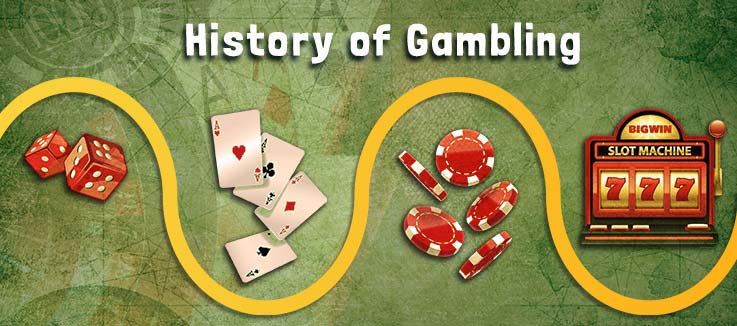Gambling history

Blog Bonus:
Redeem code "HISTORYBLOG" for 10 free spins on Asgard.
General T&C's apply.
Unlike our totally awesome online casino, most brick-and-mortar casinos have a dress code. This means that as a visiting punter you’re expect to dress a certain way.
You won’t see blokes rolling around in a pair of Dunlop volleys, nor will you see sheilas wearing Ugg boots. Instead most people will be dressed to the nines. And although many modern casinos have relaxed their dress code. There’s still a certain standard of outfit that you should wear.
Planning on mixing up your betting experience? Then maybe an excursion to one of Australia’s many brick-and-mortar casinos is on the cards (pardon the pun). If that’s the case, this article will help you out.
Shine those shoes. Rock that pearl necklace. And get ready to look like a million bucks. Because the following article on how to dress for a casino may just help you win that very amount.
Gambling through the ages
It’s hard to put a finger on just when gambling became a ‘thing’. All we have to go off is ancient records that are dubious at best. Think tattered manuscripts. Chipped vases. Stone carvings that could be of anything really. Below are just a few historical references to betting and gambling. Funnily enough… you won’t find any references to koalas in them.
Egypt – 6,000 BC
Dice made from the tusks of elephants were found in ancient Egyptian tombs in Thebes. Dating from around 6,000 BC, its presumed that these dice were used in a game that’s somewhat reminiscent of modern-day craps.
Now… we know that dice don’t directly prove that the Egyptians were gambling way back when. But fast forward a couple of thousand years and we can find evidence on papyrus scripts that betting was very much alive and well.
However instead of being praised as a form of constructive entertainment, these scripts widely condemned gambling.
They even suggested that there were laws that existed which were used to regulate gambling throughout the Egyptian empire. With anyone caught breaking these laws sent to work in quarries as forced labour.
No wonder they built so many massive structures.
China – 2,300 BC
While the origins of gambling are kinda murky, most historians can agree that one of the first accounts of it occurring was discovered in China.
The evidence was in fact some tiles. These have been dated back to around 2,300 BC. It’s thought that these tiles were used in some type of lottery.
There’s also literature from China that makes reference to gambling. Called the ‘Book of Songs’, it mentions something called the drawing of wood, which may or may not have been a game of chance.
In addition to these titles and the book though, there’s even a game called ‘baige piao’ that involved racing pigeons and numbered tickets. Could this be one of the earliest forms of keno?
Rome and Greece – 500 BC
After the Chinese started peddling various forms of betting to the masses, Rome and Greece chipped in their contribution.
Dice were claimed by the Greek bard Sophocles to have been invented by a hero during the battle of Troy. But this was written in 500 BC. And dice were known to have been around since at least 4,000 BC due to the fact they were found in Egyptian tombs.
So what type of punting existed in Rome and Greece around 500 BC then? Well… according to historians pretty much anything went in these ancient societies. The catch here is that gambling was totally illegal. So whether it was betting on a chariot race, lotteries run by soldiers or even friendly wagers between mates. You risked a serious penalty if you were caught rolling dice in a Roman or Greek back alley.
But of course those crafty Romans had a way around this. Rather than gamble using coins, they used chips instead. This way they could simply claim that they weren’t actually punting with real money. This may even be the first evidence of gamblers rorting a loop hole.
Korea – 6th Century
Skipping forward a few hundred years, we find ourselves in the land of Korea. During the 6th century cards made from a combination of paper and silk were used in betting games. Called ‘silk arrows’, these cards featured designs that blended fortune telling, numbers and icons.
The most famous punting pastime in Korea throughout this century though was undoubtably a two-card game that resembles present day baccarat. Although if you were to see it played live, you wouldn’t think they were similar. It’s evolved so much from then to now that it’s practically unrecognisable.
France and Italy – 17th Century
As we get closer to the modern era, we start to see more and more familiar casino games. The French game of vingt-et-un (translated to 21) for example is considered to be the OG version of blackjack.
Invented back in the 17th century, this game arrived in the US along with an influx of French settlers. Once there it took on many different variations. Sometimes only the dealer was able to double, whereas other forms had the dealer’s card visible. Some didn’t even require the dealer to stand on 17. Talk about a bummer…
But the French weren’t the only ones making gambling more prolific during the 17th Century. Their southern neighbours back on the Old Continent were also erecting gambling houses that could be called an early version of a casino.
The Ridotto in Venice, which was established in 1638, is one such gambling house. Founded in order to make gambling more organised during the heady days of carnival season, the Ridotto offered a number of different games for punters to test their luck on.
One of these was birbi, which is a lottery style game that has players placing bets on 1 of 70 different outcomes. Another game called basetta is regarded as Italy’s most famous card game from yesteryear. It’s called a mixture of poker, gin rummy, and blackjack.
United States – 20th Century
Like the Romans before them, the United States wasn’t all that keen on gambling either. In fact, they outright banned it at the turn of the century. Throwing anyone who was caught in the act of punting straight into the slammer.
The lack of opportunity for people to gamble went hand in hand with alcohol prohibition. Taking this into consideration, it’s hard to imagine anyone having fun in the States during this time. It took the stock market crash of the late 1920s for the government to revisit these bans.
Then in 1931 the very first casino was built on a forsaken stretch of highway that went by the name of Las Vegas Boulevard. It was called the Pair-o-Dice Club and it paved the way for many other legal gambling establishments to open. Along with casino resorts such as the El Rancho Vegas, which opened in 1941 with 63 rooms.
These days, gambling is tolerated pretty much everywhere around the world. Casinos such as the Wynn and the Bellagio are famous. As are the many high rolling casinos from Macau to Monte Carlo and yes… even the Crown Casino in Melbourne.
Of course games such as two-up are only to be played on one day during the year. But when you’ve got access to Fair Go 24 hours a day, 7 days a week and 365 days of the year… it’s never been easier to win some extra dough.
The oldest casino games still played
Roulette
Roulette is perhaps the most glamourised table game at the casino. But did you know that it was actually born in France in the 18th Century?
Yep… those French sure knew how to have a good time. The word roulette even means ‘wheel’ in Français. As for the individual who actually invented it, well we know now that the credit goes to a physicist by the name of Blaise Pascal.As the story goes, he created an early version of the roulette table when trying to create a perpetual motion machine. Talk about having a windfall.
But the French can’t take all the credit for producing roulette. Apparently the idea to put numbers on the reel came from the aforementioned Italian game of biribi. So really… I guess we can go out on a limb here and say roulette is an equal French and Italian invention. Although we’re sure they won’t agree with us there.
Blackjack
Another highly publicised casino game is blackjack. Played in land-based casinos and on online casinos the globe over. Blackjack’s popularity comes from the fact that it’s both fun and simple to play…
It was thought to have come out in the 17th Century. This makes it at least 100 years older than roulette. The first reference to blackjack was famous Spanish author Miguel de Cervantes. Except instead of calling it blackjack, he called it twenty-one.
Twenty-one is but an echo of today’s version of blackjack. And while they do share heaps of similarities, you could say that blackjack is the Americanised form of twenty-one.
Any changes that’ve been made over these years have been made by the casinos. Purely for the sole reason they were trying to keep people more interested in playing at their establishments. And whatever they did… it worked.
Keno
You can find a keno game running in different bowling clubs, RSLs and casinos throughout Australia. But keno wasn’t an Aussie innovation. It wasn’t even invented in an Anglo country.
As we mentioned earlier in this article… the origins of keno can be traced back to China. And more specifically the Great Wall of China. According to some, keno was one of the ways that the government at the time raised funds for the construction of the wall.
Although this may be more legend than truth. It still doesn’t change the fact that the first evidence of keno is in the Chinese game baige piao, which combined homing pigeons and numbered tickets. Chinese immigrants were also the first people to introduce keno to the Western world in the 19th Century… so there’s that.
Craps
Finally, we have craps. This takes the cake as the oldest casino game still played today. Thought to have been around way back in 6,000 BC when the Egyptians first invented dice. You can now expect to find a craps table in every good land-based casino that’s worth its salt.
But we digress… there is some conjecture about the origins of craps. One of these is that craps was instead invented during the 12th Century in the midst of the crusades by Sir William of Tyre. The Greeks also claim that some form of craps was played back in 400 BC.
In any case, craps as we know it today eventually took hold in London. From there it found its way to Europe before being introduced into the United States. And more specifically to the booming entertainment capital of the south, New Orleans.
And from there the rest, as they say, is history.
Play your favourite online casino table game at Fair Go casino.









